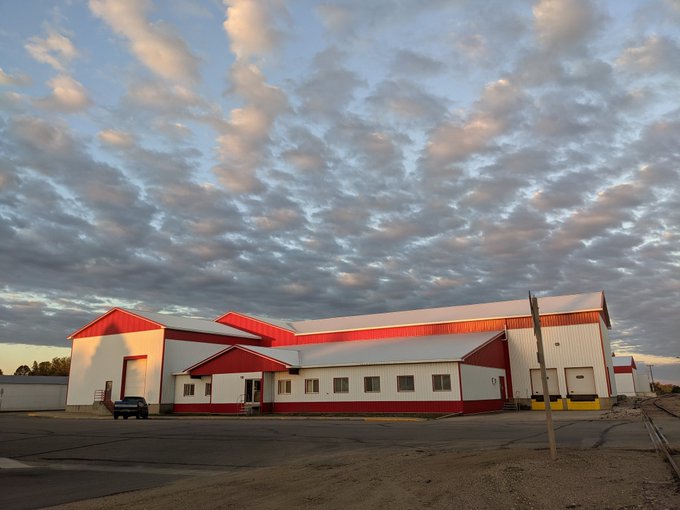South Dakota’s agriculture and research strengths among key advantages
Volga, SOUTH DAKOTA — Volga has been chosen as the home to a new distribution facility for the new U.S. focused division of a major agricultural feed technology company.
The doors have officially opened on the new “CBS America” distribution hub that anchors a major U.S. market expansion drive for Canadian Bio-Systems Inc. (CBS Inc.), a pioneer and leader in bio-based feed technology headquartered in Calgary, Alberta, Canada.
“We had been looking for a prime location to serve as the distribution hub to our enhanced U.S. operations,” says Krisjan Jones, CBS Inc. Operations Director, who visited the state and site earlier this year as part of the site selection evaluation process.
“We found that Volga is the perfect fit. We have been welcomed with open arms and are extremely excited to be a part of the business community and industry in this region.”
Facility to service rising demand
Arguably no industry is more essential than agriculture, notes Jones. CBS Inc. has been in a period of record demand for its science-driven feed technology solutions that add value for livestock operations.
The company’s signature Feed Science Platforms – which will be the focus of activity at the Volga facility – include a full range of cutting-edge bio-based feed additives that support the efficiency, health and performance of swine, poultry, ruminants and more.
“Innovation is needed more than ever to keep agriculture strong, efficient and profitable for livestock producers and their industries,” says Jones.
“As we all continue to make our way through these challenging times it’s inspiring how farmers and their industries here in South Dakota and across the U.S. have adapted. Our role is to support them with technologies that make a real difference at the farm level.”

Strong local advantages
South Dakota’s deep roots in agriculture and many advantages as a supportive environment for related science and business innovation are key reasons why Volga was chosen, says John (J.D.) Baltzell, the lead technical representative for CBS America. Agriculture is South Dakota’s leading industry with an estimated $21 billion impact on the economy.
“South Dakota is real farm and livestock country,” says Baltzell. “The people here just get it when it comes to the value of the industry. It’s a great place to do business in agriculture and to have as our home base.”
The region and state fit well regarding logistics and efficiencies relevant to the North American CBS network of partners and customers, says Baltzell. The location also holds advantages related to materials access and expedited US regulatory engagement, driving further competitive advantages for CBS America customers.
SDSU relationship
Another key factor was close proximity to South Dakota State University (SDSU) in nearby Brookings, says Rob Patterson, CBS Technical Director. SDSU is a global leader in animal agriculture research, particularly in swine, and a long-standing research partner of CBS Inc.
Following the official launch of CBS America this past Independence Day the company has established a renewed three-year research partnership with SDSU that will focus on investigating innovative technologies for swine nutrition.
“The relationship with SDSU is an important cornerstone to our U.S. operations,” says Patterson. “It provides us with world class research that fuels our model of continual innovation. We are extremely pleased to formally extend this partnership – it adds a lot of momentum to the outlook for our U.S. business activities as the Volga facility ramps up. The future is very bright and we’re in a great spot to really drive some new opportunities.”
Feed technology solutions
Making a difference at the farm level has always been the focus of CBS, says John (J.D.) Baltzell, lead CBS America technical service representative.
Today, that focus has never been more important as producers adapt to new rules and marketplace expectations, including the heightened demands for livestock operations to support reduced or antibiotic-free systems. Working closely with local veterinarians and nutritionists CBS Inc. strives to help producers meet this challenge by offering new science-based innovations.
“Animal agriculture like all major industries is continually tasked with boosting efficiencies to remain sustainable and competitive,” says Baltzell.
“Feed technology remains on the rise as one of the top opportunities for livestock operations to make continued advancements, by getting more value out of feed and operating at optimum efficiency and profitability.”
The new Volga facility for CBS America will serve as a distribution hub for the company’s Feed Science Platforms. This includes five key areas:
Multi-Carbohydrase technology is a leading-edge area of enzyme technology pioneered by CBS Inc. that involves utilizing multiple enzymes with multiple activities to achieve a high level of targeted feed breakdown and nutrition capture.
Enhanced yeast technology features natural growth promoter (NGP) activity supporting healthy animals and optimized productivity.
Functional fatty acids are gaining rising attention today in particular for their potential to replace conventional options and support systems moving toward reduced use of antimicrobials.
Grain management technology focuses on safeguarding feed quality to provide a valuable quality assurance tool and insurance policy for both feed and animals.
Phytogenics & probiotics represent innovative plant-based extract technology that helps support a positive and nurturing environment critical to get the most efficiency and benefits from feed and nutrition approaches.
Right solutions for the times
Bio-based approaches also fit with the preferences of consumers who particularly over the past decade have shown greater interest in where their food comes from and how it is produced. Because bio-based feed technology represents science-based formulations of quality nutrition enhancing ingredients utilizing natural processes, they are viewed as a positive input to agriculture and food systems.
“Livestock production keeps becoming more sophisticated and is evolving at a fast pace,” says Baltzell. “These new tools have an important role in helping producers keep competitive and take advantage of emerging opportunities.”


